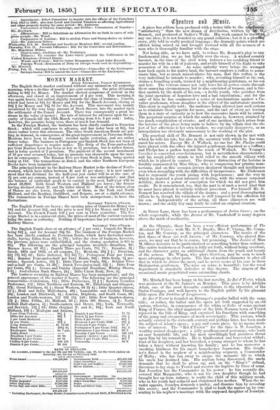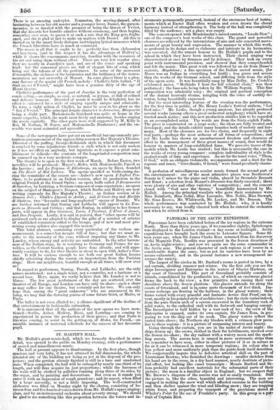Mr. Mitchell has been happy in his last novelty, le
Rai d' Pieta, which was produced at the St. James's on Monday. piece is by Adolphe Adam, one of the most favourite contributors to the repertoire of the Opera Comique, and well known to the English public by his pleasant little opera The Postilion of longiumeau.
_Le Rai d'Y'vetot is founded on Beranger's popular ballad with the same title; or rather, the ballad and the opera are both suggested by an old custom, whereby, in consequence of the whim or frolic of some ancient Ring of France, the chief magistrate of the little Norman town of YVetot rejoiced in the title of King, and exercised his functions with something of the pomp and circumstance of mock sovereignty. This custom, which actually existed in the sixteenth century and perhaps later, has been made the subject of Adam's opera ; a gay and comic piece, by no means desti- tute of interest. The " Roi d'Yvetot " for the time is M. Josselyn, a wealthy retired shopkeeper; a jolly goodhumoured personage, who leads an easy hospitable life, and has most unwillingly had greatness thrust upon him by his townsfolks. He is kindhearted and benevolent withal ; fond of his daughter, and her betrothed, a young stranger to whom he has taken a fancy without knowing his family ; and he has moreover a sneaking kindness for his smart housekeeper Jeanneton. His daugh- ter's fiance- is the nephew of a neighbouring seigneur, a Commander of Malta ; who has run away to escape the monastic life to which his uncle has destined him. His asylum being discovered, the uncle demands that he shall be given up, and, on the "King's" refusal, threatens to lay siege to Yvetot and recover the fugitive by force of arms. But Josselyn has the Commander in his power : he has recently dis- covered that Marguerite, who is not his own daughter though he bad brought her up from infancy, is really the child of this military monk, who in his youth had seduced and abandoned her mother. When the in- vader appears, Josselyn demands a parley, and disarms him by revealing this secret ; and the Commander is glad to hush the matter up by con- senting to his nephew's marriage with- the supposed daughter of Josselyn. There is an amusing underplot. Jeanneton, the serving-damsel, after hesitating between her old master and a younger lover, Daniel, the garcon- /murkier, is so dazzled with the prospect of being the Queen of Yvetot, that she discards her humble admirer without ceremony, and then begins, somewhat over soon, to queen it at such a rate that the King gets fright- pitied, and she is glad at last to make up matters with Daniel. All this is 6irricd on in the smart lively dialogue and tripping lyrical measures which the French librettists have so much at command.
The music is all that it ought to be : perfectly free from elaboration and heaviness, (and in this respect it has the advantage of lIalevy's,) while it shows the consummate musician, familiar with the resources of his art and using them without effort. There are very few regular airs ; they are mostly in Josselyn's part, and are of the comic and speaking kind : but the concerted pieces are full of elegant bits of song, which bring out the talents of all the performers. In some of the morceaux d'ensemble, the richness of the harmonies and the brilliancy of the instru- mentation are not unworthy of Mozart. In some places there is a plea- sant flavour of the quaint old French melody : Chollet's little ballad, " II etait un roi d'Yvetot," might have been a genuine ditty of the age of Henri Quatre.
Chollet's performance of the part of Joseelyn is the very perfection of comic acting,—so simple, so easy, so natural, so joyous, so full of refined and delicate humour. Divested of music it would be delightful, but its effect is enhanced by a style of singing equally unique and admirable. To form a right notion of Chollet, he must be seen in his glory as the " Roi d'Yvetot." The principal female character is Jeanneton, Marguerite being a slight part. Mademoiselle Guichard was quite at home in the rustic coquette, which she made most lively and amusing, besides singing -the music capitally. The other parts were well supported by M. Killy le Roi, M. Nathan, M. Boyer, and Mademoiselle Dwahauser ; and the en- semble was most animated and agreeable.



























 Previous page
Previous page